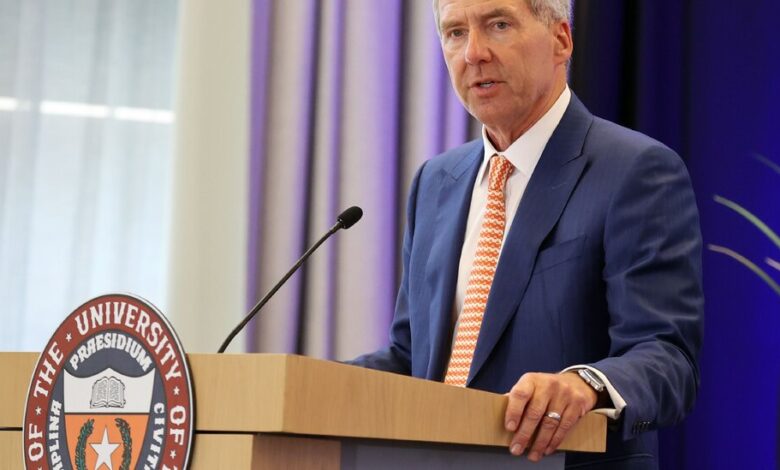University of California’s New President, James Milliken, Will Come From Texas

The University of California system announced on Friday that its new president would be James B. Milliken, a longtime public university leader who currently serves at the University of Texas system and previously ran the City University of New York and the University of Nebraska.
At a fraught time in higher education, Mr. Milliken, 68, is regarded as an experienced and relatively safe choice to lead the nation’s most prestigious public university system.
Mr. Milliken, known as JB, will take over the system of nearly 300,000 students at a time when the Trump administration is targeting the nation’s elite universities — and has the U.C. system in its cross hairs. All 10 University of California campuses are under investigation by the administration for various reasons, including admissions practices and allegations of antisemitism.
So far, the California system has escaped some of the deep federal funding cuts the White House has announced that it was imposing at other universities. The system does, however, face a proposed cut of about 8 percent in its share of the state budget, as California seeks to manage a projected long-term deficit.
In announcing Mr. Milliken’s selection, the University of California Board of Regents said that the new president “understands how critical U.C.’s contributions are to the state and the country, and he has decades of experience leading public institutions during times of unprecedented change in higher education.”
Highlighting Mr. Milliken’s commitment to low-income students, the regents referred to his stewardship of the City University of New York system, where he served from 2014 to 2018.
He was known for improving graduation rates at CUNY even as state funding cuts led to deteriorating facilities. He oversaw the opening of the CUNY School of Medicine, which focused on New York’s underserved communities.
When he announced he was stepping down in 2017, he was being treated for throat cancer. He remained on the faculty at CUNY before joining the University of Texas system as chancellor in 2018.
At U.T., Mr. Milliken was known for championing an effort to provide free tuition to students whose families’ incomes were below $100,000. He also oversaw the implementation of a state law abolishing diversity, equity and inclusion offices, testifying to the Texas Legislature that 21 offices in the system had been shut down and that 311 positions had been eliminated.
In a statement, Gov. Gavin Newsom of California said the new president “brings years of experience and the steady, strategic leadership needed to expand U.C.’s impact.”
“California’s future depends on the strength of our institutions, and few are more vital than the University of California,” Mr. Newsom said.
Mr. Milliken, who was introduced at the Board of Regents meeting in San Francisco on Friday, noted that “we are facing unprecedented times in higher education for many reasons, and I think we all recognize what they are, in terms of funding from the federal government, in terms of perceptions and attitudes of the public.”
“We need to do everything we can to right that ship,” he said.
At the same time, he added, universities must keep pace with advances in artificial intelligence and other technological developments.
“We know that higher education faces challenges and changes,” he said. “What will not change is the University of California’s historic mission, teaching, research, health care and public service.” He capped his remarks with the university’s motto, “Fiat lux,” meaning “Let there be light.”
Mr. Milliken was born in Fremont, Neb., and obtained his bachelor’s degree from the University of Nebraska in 1979 and a law degree from New York University in 1983. Before joining academia, he practiced law in New York with the Legal Aid Society and, later, with the firm Cadwalader, Wickersham & Taft.
His selection follows the decision by Michael V. Drake to step down from the job in July. Mr. Milliken will assume the University of California’s leadership on Aug. 1 at a salary of $1,475,000.




